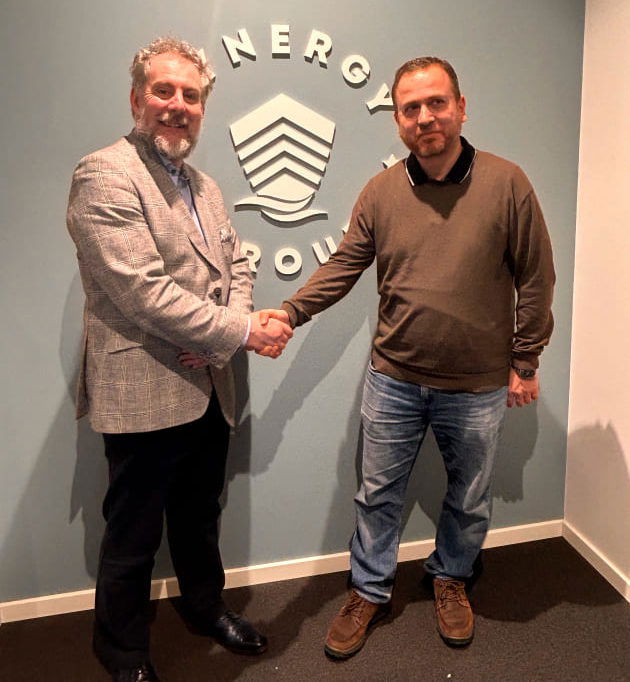Trace long tenure at Synergy and Maersk Tankers as Captain Jim sketches an impactful life with history, nostalgia, insight and wisdom.
1. How did you feel at the very start of your first voyage?
I was both excited and apprehensive. I had already completed 12 weeks of pre-sea training at Gravesend Sea School, so I had some preparation. I joined the MV “CENTAURMAN”, a chemical tanker owned by Rowbothams (who were affectionately known as ‘Rockies’) at Felixstowe, as Deck Boy. Right away there was painting, maintenance and a lot of tank cleaning. Overtime was paid at 27½p per hour – there was a tiny half penny coin in those days – and there was extra for working Saturdays at sea, Sundays in port and Sundays at sea, and also for loss of sleep. There was no working time directive, with required rest hours, back then.
2. Throughout your career, who, or what, has had the most influence on you, and why?
The biggest influence was my realising that I needed to use my brain and get some qualifications, in some way, to show my parents that I could make something of my life. At school I had the ability but just could not be bothered, but I hope and think that I made up for this on the academic side of my maritime training.
I was lucky in that my employer was involved in a scheme where they paid for Ratings to attend college and progress to being an Officer. I attended Greenhithe Nautical College (in southeast London) and gained a Class 5 Certificate of Competency (equivalent to the Mate’s Home Trade Certificate) and was soon after promoted to Third Officer. A few years later I was promoted to Second Officer, and after some further time at Greenhithe I achieved a Class 4 Certificate (Second Mate’s Foreign-Going) and then at South Shields (in the northeast of the UK) I completed the bridging course (maths, physics and principles of navigation) to gain a Class 3 Certificate. I decided to take the plunge and spend a whole academic year at South Shields to try to obtain a Class 2 Certificate. I was successful, and even managed to take an extra oral exam for a Master’s Home Trade Certificate and was promoted to Chief Officer in 1990.
A few years later the ship I was on was sold. I decided that it would be a good time to get the required foreign-going sea time to allow me to sit the Master’s oral exam. Again, luck came in, as one of the Personnel Officers had previously been with Maersk, and he recommended that I apply for a job with that company, so I then became Chief Officer for two vessels on alternate charter to the Ministry of Defence. After getting the required sea time, I went back to South Shields for two weeks of revision and passed the Master’s oral exam. In 1999 I was promoted to Master of the “MAERSK GANNET”.
Later, I was fortunate to be chosen for three newbuild projects in China and South Korea, which I felt to be a great privilege, and for my last five years I sailed on C Class vessels. I was a tanker man all my working life.
3. In your maritime life, what was the worst mistake that you ever made?
One thing was that shortly after I had assumed command of the “MAERSK GANNET” we lost the port anchor and all twelve shackles of cable in 3000m of water, at 05:00 and about six hours before arriving in the Falklands. Luckily, the link just before the bitter end (the last part of the chain, near to where it is fixed to the vessel) failed, so there was no additional damage. I thought immediately that my time in command would be swiftly over, but with Maersk if you were honest about an error and could learn from it there would be no recrimination, and it did not affect my career.
4. What are the biggest changes that you have seen since you started sailing?
There have been many changes. When I first went to sea there was no ISM, SIRE vetting inspections, Port State Control or, as already mentioned, rest hours. Nowadays there is much more emphasis on documentation and inspection, and the role of the seafarer has altered greatly. For a navigator, for example, the Lateral Buoyage system has been replaced by the IALA system, paper charts have been pretty much replaced by ECDIS and electronic navigational aids far outstrip the old Decca Navigator and Loran C.
The Decca system was for the UK and NW Europe and as far south as just past Gibraltar into the Mediterranean Sea (though it was also used around the South African coast), and when entering the Mediterranean positions were taken by astronomical sights and days run by trailing the log line, and as the Decca coverage ended I once saw written on the edge of the chart “goodbye, old friend!”
Some of my early tankers had gas-powered stoves, with the gas bottles stowed at the aft end of the bridge deck, which was all wood and used to be polished with what was called holystone (a block of soft sandstone that was used for scrubbing and whitening wooden decks, and which can sometimes be seen in films), and one of the tankers even had a lifeboat with oars as backup.
Crews have changed, too – they are less in number and more in nationalities, and the more interesting for that. My second ship had a crew of 28, but just a few years later it was down to 15, not because things were easier but due to the reduced strength of the trade unions.
5. What is the most important change that should be made to a modern seafarer’s existence?
Life at sea these days is far more stressful, with shorter port calls and less chance to go on shore. So healthcare has to be seen as the top priority, especially as regards mental well-being, which is still something that is not discussed as much as it should be, and that needs to change. Also, the amount of paperwork required, including electronic documentation, is ever increasing, and this is burdensome. Computers were supposed to bring about the end of paperwork, but this is not the case and it needs addressing.
6. What are your thoughts on women seafarers?
I think this is brilliant. I am very proud that one of my former Deck Cadets is Captain Kirsty Bruce, and this shows that women can make it to the highest rank. Sadly, though, there is still a shortage of women who view seafaring, or a role on shore, as a career. I know some say that quotas are a bad idea, but having just been working on the Brazilian coast, where one of the requirements is for a percentage of Brazilian nationals, we had several women on board, as Third Officers and Engineers.
Recruitment needs to address this, to try to encourage more women to come to sea, both as Officers and Ratings. Also, there has to be more emphasis on women in shore-based managerial positions. As far as I know, there are not yet any female Technical or Nautical Superintendents.
7. What are the risks and benefits of autonomous cargo ships, and do you think that some day all vessels will be crewless?
I cannot see there ever being a time when ships are fully autonomous. There will always be some form of piracy at sea and vessels with no crew on board would be easy targets. Also, no computer system is infallible, so a ship will always have say two or three crew on board to protect it, in all respects, with everything else in transit being done by computer, and with additional crew boarding on arrival for mooring, cargo operations and maintenance, and then disembarking just before departure. There will always be inspections, too, and realistically these cannot be done by computers or drones.
8. What are your plans for retirement and what will you miss most?
I have been a philatelist since early childhood, and stamps and postal history have always been my way to relax. I am a life member and Fellow of the Royal Philatelic Society London, a worldwide organisation based in the heart of the City of London, and am currently Chair of the Collections Committee. I get to engage with fellow philatelists from all over the world, some of whom have also been seafarers.
I will miss being in the middle of the ocean with no other ships around and seeing a brilliant sunrise or sunset, and (most of all) clear nights when you can see all the stars, with no light pollution, which is magical.
9. What advice would you give to anyone considering a career at sea?
There is an old Chinese proverb – a journey of a thousand miles starts with a single step. I believe that the younger tech-savvy generation needs to realise that there is no need to rush. They all seem to want promotion quickly, but they have to understand that foundation knowledge at every level is necessary. When everything is working that is fine, but one needs to know what to do when something goes wrong or fails.
When one begins a career at sea, it might seem that reaching the rank of Master or Chief Engineer is a long way off, but this is something to aim for. The rewards once one gets there are what makes the journey worthwhile.
And when you join your first ship, do not forget your toothbrush!

10. Do you have any final thoughts to share with us?
As I said earlier, it was more by luck than anything else that I joined Maersk, and nearly 30 years later I am very pleased that I did. I would like to express my thanks to all the Officers and Ratings who I have had the pleasure of sailing with, and likewise to all those ashore who have assisted and supported me over the years.
I wish all smooth seas, fair winds and a successful future.



